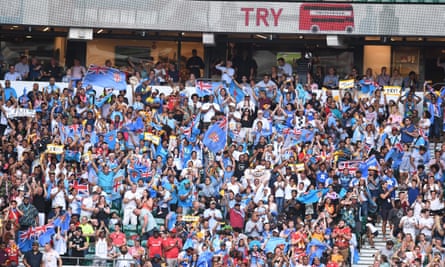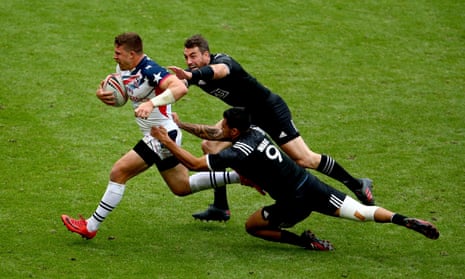Around 50,000 people went to a rugby event last Saturday. They all seemed to have a ball, cheering, singing, drinking and eating. It would be a surprise if a thousand knew more than a couple of the players and many would have been hard pushed by the end to tell you any of the scores. Twickenham became London’s biggest pub garden for the London Sevens and it was a startling experience. And not in a bad way.
The vast majority of the crowd were in fancy dress, which looked less ridiculous late-afternoon than late morning. There were very few of us outside the 20 to 35 age bracket. These young people were here to have fun and spend serious money. Tickets were relatively cheap, but drinks were £5 and food £10 a plate, and they bought a lot of both. There was a party atmosphere with a fine covers band rocking the concourse into a mosh pit and a funfair for those who wanted to get away from the carnage. The closest I saw to anyone losing their temper was when a bloke accused me of stealing his beer glass (I hadn’t).
The rugby was hugely entertaining, but the event was set up so you could enjoy yourself thoroughly even if the sport was hopeless or you had no interest in the first place. Sevens suits that, as does its sibling, rugby league nines. I left Twickenham baffled that the RFL and RLEF appear to have no interest in nines as a promotional vehicle for league, and that the NRL and RLIF are happy to deliberate and prevaricate for so long that there are no major elite nines tournaments anywhere this year, and the World Cup 9s, scheduled for October 2019 somewhere in Australia, has yet to be confirmed.
The similarities between sevens and rugby league – especially nines – are numerous. Anyone who has played one could soon learn the other and league backs fit straight in to a sevens side. The only non-English player I knew was Fiji’s Semi Radrardra, the former Parramatta Eels and Kangaroos wing who was used up the middle to devastating effect by the eventual winners. Several of the Australians were from league backgrounds, too, including diminutive livewire Maurice Longbottom. Considered too small by South Sydney, he turned to Oztag and worked his way back into pro rugby. What a talent. Canada were coached by former Batley player and Leeds Rhinos assistant Damian McGrath, who went from England 13s assistant to England 7s boss.

England, who were beaten by South Africa in Sunday’s semi-final, had a Wiganer (Dan Bibby, who, bizarrely, has never played league) and a Burgess (Phil – no relation) but were all union players, the majority young pros who discovered they are better at sevens than XVs and got a full-time contract on the World Series tour. England are ranked sixth but could be higher if the RFU and elite clubs took it more seriously, as the USA (fifth) and Kenya (seventh) have.
It is a wonder more young versatile league players are not trying to get a gig. Play every other weekend in Hong Kong, Singapore, Dubai, Vancouver and Las Vegas, ending with a World Cup in San Francisco? No thanks, I’d rather go to Batley, Swinton, Featherstone and Leigh.
International nines is an open goal for rugby league. Obsessing over staging star-studded elite events has been proved a fallacy by the World Rugby Sevens. National teams have traction; they sell tickets. It is almost irrelevant who is playing. Twickenham’s bottom tier was rammed for England v USA but they didn’t seem to mind that the visitors romped to victory.
There were supporters of most countries, including a lot of Welsh and South Africans, and hundreds of delirious Kenyans in a corner section. But the fabulous Fijians were everyone’s second-choice team, their brave offloading, outrageous flicks and sensational sidesteps a joy to behold. In a cunning move, the 16th team in each World Sevens event is invited from the region. So London’s Irish diaspora were able to cheer their team to a shock bronze medal victory over England.
The NRL 9s is back next year in Brisbane but nines won’t work here as a pre-season event. There will be teams from Fiji, Queensland, New Guinea and the USA at the inaugural London 9s Rugby and Music Festival on 22 July, though. Most second and third tier nations would field teams in summer nines events if invited. There is a gap here waiting to be filled: international nines in multi-cultural cities, in the summer, put bands on, and give everyone someone to cheer. It is not rocket science.
Clubcall: Copperheads RLFC
Few clubs can go from an idea to an opening game in a few weeks but USA Rugby League new boys Copperheads have done it. From the ashes of the Central Florida Warriors, who folded last year, came a new club, founded by former Tweed Heads Seagulls player Curtis Goddard.
Formerly with Boston 13s, Goddard is an American with a grounding in all rugby codes: league, union and sevens. Also in their rookie squad is USA international Roderigus Ceasar, who has played in Australia for Wests Magpies, and former Toronto Wolfpack and Wigan trialist Sterling Wynn.
“I want to grow the game for both men and women, introduce the league community to southwest Florida talent and build a grassroots organisation, starting with a local age grade competition around southwest Florida,” said Goddard. “We want to build up enough grassroots support to fill the MLS stadium they plan to build in southwest Florida.” Their home opener is on Saturday night against reigning national champions Atlanta Rhinos in Lehigh. Go Heads!
Foreign quota
Qualifying for the 2021 World Cup starts next week in the unlikeliest of locations: Vrchlabi, where the Czech Republic host Norway in European Championship C. They, along with Germany, Ukraine, Greece and dark horses Malta – who have access to several Australian professionals – are among 20 nations seeking the final eight places at England 2021. They will have to play (and probably win) five games to qualify; others can make it in three. Italy, South Africa and the Cook Islands will only play two qualifiers but, unlike many other nations, they will have no second chances if they flop.
Goal-line drop-out
Any Wigan fans been away for a couple of weeks? You’ve not missed much! Shaun Wane may be gone before his planned end-of-season leaving do if Wigan keep playing like they have in their last three dismal defeats; assistant John Winder is expected to take over until Shaun Edwards returns in 2019 when he has finished with Wales at union’s World Cup.
Wane is believed to be heading to Catalans Dragons and taking a leaf out of Paul Rowley’s book by signing all his favourites: Anthony Gelling the latest former Cherry-and-White expected to join Sam Tomkins and Michael McIlorum. The Tomkins boys are in big trouble and Joel will do well to remain at Orrell. The barmaids of Perpignan are sure to be thrilled at the prospect of welcoming them, Kenny Edwards and Greg Bird next year… Speaking of oafs in rugby league, treat yourself to the podcast The League Digest – their “all-time grub 17’ episode is rather entertaining.
Fifth and last
It didn’t take readers long to (almost) solve my last teaser. Yes, Kirk Yeaman and co all played for England in the 2004 European Championships, but they were all also “on debut”, as Ray Warren would say. Ben Westwood scored two of England’s 17 tries in the bizarre 98-4 crushing of Russia in front of a thousand bemused Moscovites on the Olympic Stadium’s artificial pitch, then Jon Wilkin replaced Richard Whiting to make his England bow in a comfortable win over France. Who would have thought they would all be going strong at the top – the very top in Wilkin’s case – 14 years later? Respect.

Comments (…)
Sign in or create your Guardian account to join the discussion